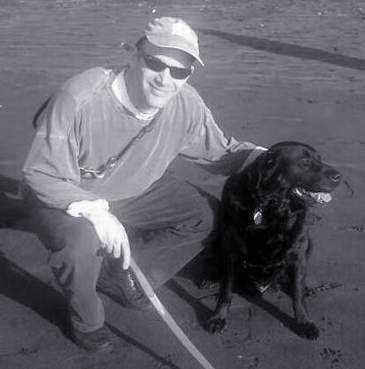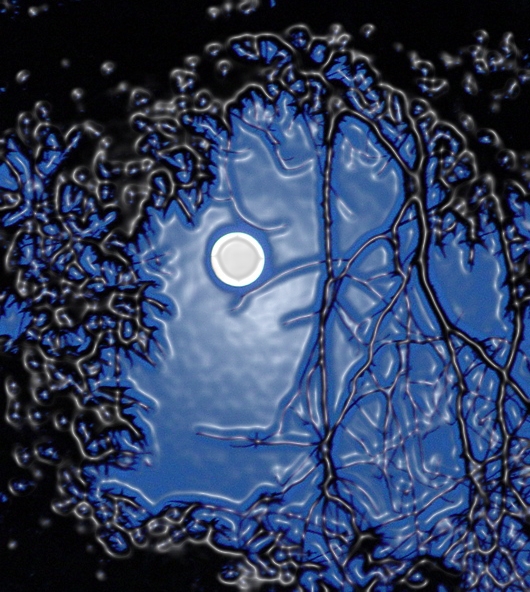
Mary Akers: Hi, Doug. Thanks for giving us your excellent short piece “Traces in the Winter Sky” for this issue. I think what struck me about it right away was that it’s about a marriage, about love, but it isn’t tragic, or ironic, or forced. How refreshing! Instead it’s about recovering the love in a marriage, and what married person doesn’t have to do that almost every day of married life? I’m curious: was that the recovery theme that you also felt would make it a good fit for us? Or did you have another take on this story?
Doug Bond: Ha! Great first question, Mary. Yes! I did have another take on this story…but only at first, many, many revisions ago, and as it nudged slowly along to its current state I can say that it was my discovery of r.kv.r.y. and the mission of your journal which gave me the impetus to stretch the way I’d been approaching the story.
The piece started out as a simple sketch of a middle aged guy walking his dog on a cold clear winter night, the Orion constellation prompting in him a reverie about youth and 1st love.
So the first sense for me of “recovery” in the storyline related to a past, an emotional state, that had gone lost. As I continued to work on the story, I was led to a conception of this man, Tyler, as a person who has recently gone blind. The motifs were already there: searching in the dark, distant light, Orion’s mythology (once blinded but sight regained), the presence of the dog (a lab!) I just didn’t see it at first! The first set of versions in which I made the blindness too present felt heavy and freighted, so I tried backing off on making his sightless-ness overt or specific in the narrative.
The withholding of information ended up creating an intriguing tension which I felt balanced the more potentially syrupy or sweet framing in the story. As it turns out it’s not necessary at all for the reader to know or believe Tyler is blind. But since I wrote with this strongly in mind, I ended up relying on senses other than sight to set his relationship in the world.
Once I had the “blindness” done right in the story there was still something missing…it couldn’t just be him feeling sorry for himself and remembering the good old days. So the biggest epiphany for me in writing the story came in discovering that the girl, Jenny, he romanticizes during his memory of high school is, fifty years later, the woman waiting for him at home. I began to see them together…like the two stars in Orion’s belt…so close together, they’d become one, a co-dependence, and it’s tensions, escalated by Tyler’s infirmity in the world.
I did some superficial research on the constellation Orion (ok, I “Wiki’ed it). But this line re: the double star (Mintaka) in the belt really anchored the piece in my mind as being at core about the marriage: The Mintaka system constitutes an eclipsing binary variable star, where the eclipse of one star over the other creates a dip in brightness.
Eclipse and recovery. The sum greater than the parts, something that can project an elegant luminescence from a distance wherein at core is a fiery exchange of energy between two distinct entities rotating in mutual dependence.
Yikes! Is it any wonder we project so much onto the night sky…it’s been pulling stories out of us for a long, long time! But truthfully, I really didn’t have a theme in mind at all when I wrote this…I just wanted very badly to have a story published with both the word’s Betelgeuse and Rigel playing a starring role.
MA: Oh, I love what you say about the night sky pulling stories out of us for eons. So true. Brilliant.
Your use of time is interesting in this story, too. Tyler spends at least as much time thinking about the past as he does existing in the present. And the past is where the change of heart occurs for both the character and the reader. I find that time shifts can be really tricky to convey, but you do it well here. Are time shifts and backstory devices that you feel comfortable using to tell a story?
DB: Thank you for saying that the time shift worked. It was tricky. Lots of re-writes, and the adding of little subtle details in an attempt to try and not disorient the reader. Since the emotional energy for me in telling this story came from a place of wistfulness, I pretty much had to commit to a time shift. Tyler is in the present and I want the reader to be inside him in that “now” but to know what he’s feeling about the past and what it is that he is contending with in these memories.
The “blindness” conceit actually helped here since I had to make all of the “present” setting experienced by him exclusively through non-visual references…the sounds, of wind, dog tags, the coldness of the air and the ballasting feel of a tree trunk. Tyler’s communion with the past comes to him through the non-visual senses too…taste and smell, but the memory of light is what comes through the strongest.
I had strong advice in an early draft to avoid any in depth backstory. Ended up being a goad. There are so many un-written rules about writing, and particularly flash-fiction….what “not” to do and time-shift rides up there high on the lists, as does withholding information, which I am also guilty of….ie. regarding Tyler’s blindness and just who it is he was reminiscing about. Maybe sometimes trying to dance around these rules gives an otherwise un-tappable energy to a narrative, but for god’s sake take my advice and don’t ever try to write flash with backstory. The POV headaches can make you go…well, never mind.
 MA: What did you think of Jenn Rhubright‘s illustration for your piece?
MA: What did you think of Jenn Rhubright‘s illustration for your piece?
DB: I was really floored when I saw it. I thought…how did she do that? I’d kind of expected, since the piece is so strongly anchored by the Orion constellation, that the accompanying image would be much in parallel….a re-rendering, in some creative way, of the Hunter image or of the belt or a larger tapestry of stars. Jenn’s illustration feels so much more intimate to me. She focuses the light into one delicately set white circle, pearl-like in the composition. It actually spills a reflective heat into the darker space around it…the way she captures the glow. But it’s the tangled weave of threaded black along the midnight blue that got me….an intimation of something sinuous in conflict with, but pushed aside by, the pulsing of the light. I loved this aspect of participation with r.kv.r.y. Jenn’s work brought a wonderful dimension to the entire issue.
MA: What does “recovery” mean to you?
DB: I think one’s first instinct in defining “recovery”, is to believe it has to be a return, like in the mathematical sense, to a previous balance, a putting back again to a prior state of wholeness. In the few, as yet, truly difficult “recoveries” I’ve witnessed first hand or been a part of what you realize as you come through is: that’s impossible. There really is no turning back of the clock. Time will always exact its costs, moneyback guarantee be damned.
But the gift which comes in recovery is realizing that your initial ache for “return” was somewhat puerile, and that in the alchemy of recovery lies a transformation which does indeed make you perhaps, better…improved…there’s something in the release of what’s lost which allows a new balance to be attained.
For Tyler, his life has been altered by an age-related infirmity, a dramatic one. Whether literal or psychic, he has suffered lost vision. He feels untethered. And into this doubt and confusion comes a memory, an image of something immutable, to his thinking, the winter sky, unchanged in 50 years of 5 million. It’s all a matter of perspective with the sky though, isn’t it…Red Giants, White Dwarfs, exploding Blue Supernova and an earthbound lens skewing all the angles. Everything is in flux…even the Christmas lights.
Still, if only in imagination it is the “firmament” (what a wonderfully archaic word!) which gives Tyler an arc to his earlier self, and inspires a connection with his wife, the actual touching of her face at the end of the story, renewing the light within them both, and in that way lays before them a chart of hope and endurance for the future. Thankfully they have a very well trained dog to keep them on the right path.
MA: Wonderful, Doug. Thanks for speaking with us. It’s been a great conversation. And in true guide-dog spirit…I will guide our readers to more of your fine work:
The Thing That Filled First (Used Furniture Review)
Where the Ocean Ends (Necessary Fiction)
Go hide! (Staccato Fiction)
Knock It Off, Honey (Up the Staircase)
Why Aren’t There Fireflies (Camroc Press Review)
Tea with Mrs. Doyle (Wilderness House Literary Review)

Pingback: “Traces in the Winter Sky” by Doug Bond | Rkvry Quarterly Literary Journal